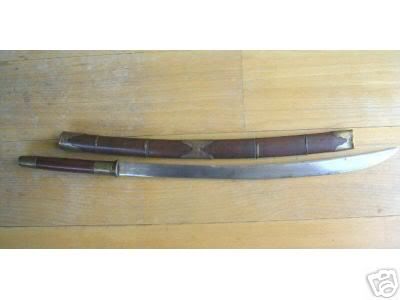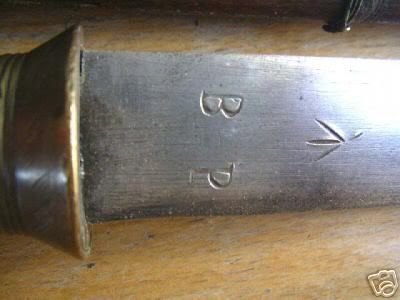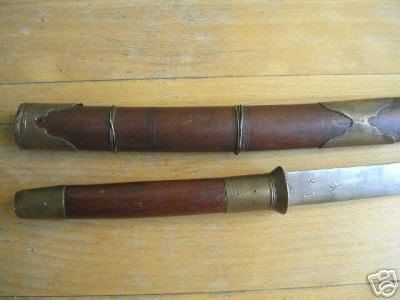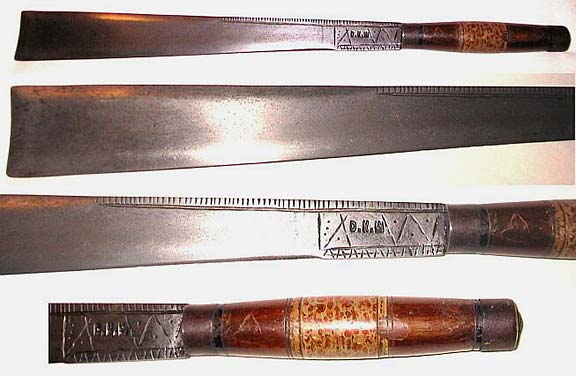
 |
|
|
#1 |
|
Member
Join Date: Dec 2005
Posts: 164
|
Anyone have pictures of or familiar with WW 2 Burma style Dha's with leather military looking sheaths?
|
|
|

|
|
|
#2 |
|
Member
Join Date: Dec 2004
Location: Virginia
Posts: 520
|
This is the only one I have that I believe is the a WWII dha. It is solid but no frills and appears to have an armory mark in the blade but the marks are shallow and difficult to photograph. Maybe I can do a rubbing on them to show them, no promises on that. The sheath is wood covered with a leather of some kind
 
|
|
|

|
|
|
#3 |
|
(deceased)
Join Date: Dec 2004
Location: East Coast USA
Posts: 3,191
|
|
|
|

|
|
|
#4 |
|
Member
Join Date: Dec 2004
Posts: 987
|
I have only seen two military dha, one Andrew's and another someone sent my for comment. Coincidently I just came across photos of the latter again last night while organizing files (photos are at home, but I'll post them tonight). Unlike Andrew's, this other one is a Kachin-style sword dao, with a very straight blade and a square tip, and the number "50" inside a box or crown stamped on the forte. It has a wooden scabbard, too, not a leather one.
Here is a photo I think Andrew had located, showing a squad of Kachin Rangers during WW2. Dha of both styles are visible in the picture; the ones the first and second (and possibly the seventh) men from the left are carrying resemble the Kachin-style dha, and the sixth man from the left looks like he has one like Andrew's. 
|
|
|

|
|
|
#5 |
|
Member
Join Date: Nov 2005
Posts: 341
|
There is a very nice PAST ebay auction of a Dha. Item number 6606853813
|
|
|

|
|
|
#6 |
|
Member
Join Date: Dec 2005
Posts: 164
|
Thanks for all the information.
I don't know what this one is maybe a Dao with a broomstick handle? It has a very well made sheath,No marks on the blade.     
|
|
|

|
|
|
#7 | ||
|
Member
Join Date: Dec 2004
Posts: 987
|
I am sure the handle is original, but it has lost its wrapping. The handles of dha are, characteristically, round in cross section, and wooden covered in metal or wrapped with cord, rattan, ray skin, etc.
Here are the pictures of the Kachin-style dao I was sent. The owner wrote the following about the sword and where it came from: Quote:
Quote:
|
||
|
|

|
|
|
#8 |
|
Member
Join Date: Feb 2006
Location: 30 miles north of Bangkok, 20 miles south of Ayuthaya, Thailand
Posts: 224
|
Bamboo, giant reed and alike are common materials for sword handle for thier toughness and shock absorbtion. Your handle 's true. Only furrule, Butt cap, and rattan grip were missing. Handle shows some damage though. Someone might try to hack something and, without furrule, then the wood simply split

|
|
|

|
|
|
#9 |
|
Member
Join Date: Nov 2004
Location: USA
Posts: 1,725
|
Ian has advised me that a British machete that resembles a Kachin dha/dao was issued, and we see these occasionally. However, I don't believe there were really very many military dha made. The Burmese irregulars surely brought their own weapons with them into service.
My example appears well made and simple enough to be mass-produced, but I've never seen another like it. If these were made and issued in large numbers, I can't help but suspect we'd be seeing many more of them on the market today.    (Mark, for the record, I believe Ian found that photo.) |
|
|

|
|
|
#10 |
|
Member
Join Date: Dec 2005
Posts: 164
|
Thank You again for all your help.
I bought it as a "WW2 Burma Doa Machete" Thank you for the confirmation. You guys really are very knowlegable about these things and never cease to amaze me. |
|
|

|
|
|
#11 |
|
Vikingsword Staff
Join Date: Dec 2004
Location: The Aussie Bush
Posts: 4,203
|
Hi Alan62:
I think you may be referring to the British Mk. 3 version of the military dah. The Mk. 3 came with a nicely fitted leather sheath, split down one side to allow easy unsheathing of the machete, and held in the scabbard with a leather strap and press stud. Rather fancy for a "crude" machete. These machetes were produced in India for the Chindit forces under Major General Ord Wingate. The Chindits were behind the lines forces who were airlifted into Japanese occupied Burma and worked with local native groups, notably the Kachin, to harass the occupying Japanese army and help keep open the Burma Road between India and China. There is a thread here about the Chindit machete: http://www.vikingsword.com/vb/showth...hlight=Chindit The dha you show above is not an example of the Mk. 3, but rather a Kachin sword dha of the WWII period in a leather sheath. The Mk. 3 is quite short, wider, and squared off at the end, more of a dao like the Kachin working sword that is carried in an open-faced scabbard. Ian. Last edited by Ian; 16th March 2006 at 06:42 AM. |
|
|

|
|
|
#12 |
|
Member
Join Date: Dec 2004
Posts: 1,712
|
Ive heard old Chindits {including my father.} use the term Dao as well as Dha for these. I think Dao is just Chinese for Knife though?
Anyway I digress. Heres the mk.2 style although amore decorative versian than most. {link to Ians. on the old forum.} {I hope that is acceptable? if not contact me & I will happily delete it.} Incidently the firm DKW also made kukri.  /////////////////////////////////////////////////////////////////// Heres the steryotypical & commonest mk.3, So far the earlyist I have seen is dated 1945 has anyone seen one actualy dated 1944? The often used mk.2 scabbards dated 43 & 44 I think? But of course may be mistaken.  //////////////////////////////////////////////////////////////////////// Heres a photo to show that Chindits also carried standard Brit. army Machetes. {Not all the Chindits were English, the also included Indians, Nigerions,Kenyans, Nepalis & many Burmese tribes.} They also of course often carried kukri.   /////////////////////////////////////////////////////////////////////////// Heres another Chindit Dao Which is niether mk.2 or 3, I wonder if it is the mk.1? But have been unable to find any photographic reference of the mk.1.  Does anyone have any information on the mk.1 ?It would be great to find out. This one seems much more weapon based than the mk.2/3 with a very slim distaly tapered blade, so much so that although it has a 16 inch blade it only weights 14 oz. in total. The scabbard is higher quality but similar style & the pillar stud & attachment loop is fitted to open the opposite way. & just for fun heres my fathers cloth Chindit badge, {only issued to him when going on leave at the end of the war. And an officers silver theatre made cap badge. In this case "theatre made" means jewelery type quality. perhaps made in Burma?  ///////////////////////////////////////////////////////////////// & a copy of the letter that went with the badge that basicly reading between the lines says dont " Youve done a good & tough job but please dont mash up or kill to many people while on leave"  Hope thats not all to far removed from Ethnographic blades? To me it all fits together. Spiral. |
|
|

|
|
|
#13 |
|
Member
Join Date: Dec 2004
Location: What is still UK
Posts: 5,807
|
Excellent, that man with the knife is a little frightening.
|
|
|

|
|
|
#14 |
|
Member
Join Date: Dec 2005
Posts: 164
|
Thank you Spiral
That is a great bunch of information |
|
|

|
|
|
#15 |
|
Member
Join Date: Dec 2004
Posts: 1,712
|
Thankyou Alan ,Tim, Glad it was of use.
Indeed Tim, definatly looks like a fellow you would rather have on your side than the enemys in a rough & tumble! I wonder what the Japanese thought of him? Spiral |
|
|

|
|
|
#16 | |
|
Member
Join Date: Jan 2006
Posts: 123
|
Quote:

|
|
|
|

|
 |
|
|